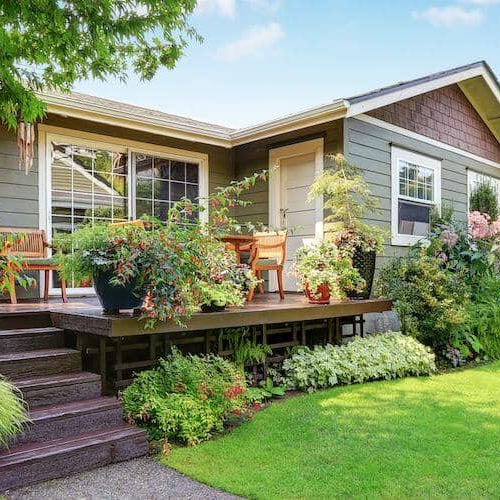The pros and cons of buying a lake house
Contributed by Tom McLean
Jun 25, 2025
•8-minute read

Many people would love to live in a lakeside home or own one to use for weekend getaways throughout the year. Lake life can be quiet, restorative, and inspiring. It’s also a significant investment, which presents a number of financial implications you must seriously consider before buying.
Key takeaways:
- Owning a lake home can be fun and provide a good return on the investment through increased property value or rental income.
- A lake home may need a lot of maintenance and require costly, specialized insurance.
- It’s important to understand all the financial pros and cons of owning a lake home before deciding to buy one.
Pros of buying waterfront property
Buying a lake house has plenty of benefits even beyond enjoying the natural setting. It can be an excellent long-term investment, provide regular rental income, and, in some cases, reduce your tax liability.
A second home can be a great investment
A lake home can be an excellent investment, as waterfront property is always in demand. Such properties likely will retain their value in the short term and may grow significantly over the years. A lake house also can generate income if you rent it out when you’re not using it. Some people will rent their lake house long enough to earn what they need to pay property taxes and maintenance for the year.
The location of a lake home can raise its value
Lake homes typically have the greatest value when they’re in an area that strikes a balance between high attraction and a slower pace. Think of a great summer resort town that gets plenty of visitors but is not so overrun with tourists that it loses its charm. If it’s the type of place you want to go back to every year, for instance, then it might have the right mix.
A lake home may be tax-deductible
Mortgage interest and property tax paid on a second residence that is primarily for your personal use is deductible as long as the mortgage satisfies the same requirements for deductible interest as a primary residence. This itemized deduction allows you to subtract mortgage interest from your taxable income, lowering the amount of taxes you owe.
Even if you rent out your second home, you can still get the deduction if you meet certain conditions. You must live there for more than 14 days or more than 10% of the days you rent it – whichever is longer. If you have more than one second home, you can only deduct mortgage interest for one of them.
A lake house can be fun
Whether it’s a getaway to decompress for two weeks in the summer or several long weekends throughout the year, a lake house can serve as a respite from your busy daily home life. Benefits include:
- Increased time outdoors. Fresh air and sunshine are good for your health.
- Access to water sports. Speed up with a boat or jet ski, or slow down in a canoe or paddleboard.
- Smaller community. Know your neighbors and participate more in civic life.
- Reduced environmental stress. Less noise and light pollution, especially on a no-engine or no-wake lake.
- Less screen time. If you choose, your lake refuge can have no television, Wi-Fi, or even cell service.
Cons of buying lakefront property
If you spend a wonderful weekend at a friend’s lake house, you might experience all the obvious advantages but not some of the challenges of owning one. Consider the amount of work and care you invest in your primary residence and then imagine devoting the same level of attention to a second home that might be a 2- or 3-hour drive away. Here are some of the drawbacks to owning a lake house you should consider:
Unique maintenance issue
Expect to spend as much time maintaining your lake home as your primary residence. You can hire a maintenance company, but those are not cheap. If there is a lot of upkeep, you could find that much of your relaxing getaway weekend is spent doing chores.
A home on the water is close to the elements. Humidity from the water may cause the materials your home is made of to break down. Sand, leaves, and dirt can require a lot of work to clean up, and the wind blows a little harder off a large body of water.
Additionally, a house located near water is more susceptible to storms, fog, and natural disasters. You may occasionally face an expensive repair, such as a damaged dock or retaining wall.
Other issues common with a lake house include:
- Mold
- Flooding
- Maintaining additional structures, such as sheds, docks, decks, and boathouses
- Foundational issues caused by shifting soil
- Storm damage
- Winter protection and snow removal
If you’re buying a lakefront property, ask your home inspector to keep an eye out for wear and tear caused by the elements.
Higher than average insurance cost
You will want to have adequate homeowners insurance for your lake home, so consult with a local insurance company and schedule an appointment for them to review the property. Here are some of the key areas you should cover:
- Flood insurance
- Liability insurance. Lake homes have more accidents. You’ll have guests and possibly renters boating, swimming, diving, and having fun until someone inevitably takes a fall on land or water.
- Boats and other watercraft should be insured for liability and damage.
- Damage and liability issues for docks, hot tubs, and outbuildings.
- Storm damage.
Flood insurance
With a lake house, you should go the extra step of adding flood insurance, which is not covered under normal homeowners insurance. Local laws or your mortgage company may mandate flood coverage.
There are two types:
- National Flood Insurance Program. With a $250,000 coverage limit, the NFIP is only available to specific, qualified communities. It’s backed by FEMA, the Federal Emergency Management Agency. NFIP won’t cover expenses incurred from staying in short-term housing until your home is safe to live in again. It also won’t cover damage to parts of your property that are not attached to the home, including boat decks, hot tubs, and septic systems.
- Private insurance. By law, private insurance must provide coverage as broad as that of the NFIP. Private insurance allows you to insure beyond the NFIP’s $250,000 coverage limit. If rebuilding your dream lake home will cost more, private flood insurance may be the way to go.
Lakes usually are public property
Some lakes are private, owned by an individual or community that can set rules and regulations for who can use them, how, and when they can be used. But most lakes are owned by a state or the federal government, which means they are open to the public. While there may be rules governing activities on the water, your lake house may be subject to people walking on your stretch of beach or swimming and boating in the waters offshore. This may all be fine, but if you find yourself annoyed with the sound of jet skis, speedboats, or rowdy behavior, there may not be much you can do about it.
When considering buying a lake house, have an idea of what activity on the lake is like at the peak of the summer and tourist season, when noise and traffic are highest. And make sure lake guidelines align with your lifestyle. If you like to pull a wakeboard on a speedboat, make sure that activity is allowed.
Most private and public lakes have rules that govern behavior on the water and beaches. Regulations guide a variety of on-water and lakeside behaviors, including:
- Access. Who can be on the lake, and where boats and other watercraft can be put in.
- Fishing and hunting. If these activities are allowed, under what conditions, when, and for which species?
- Boating. Size of boats, speed limits, restrictions on inboard/outboard motors, whether there are no-wake rules or no-motor rules, and how you dock your boat.
- Noise levels. How loud you can play music on your dock or boat, quiet hours, etc.
You might have to lease the land
Buying a lake house sometimes means you own the home but lease the land it’s built on. Utility companies, the U.S. Army Corps of Engineers, and other large organizations may own the lake itself, which means they lease out the shoreline where lakefront homes are built.
When you buy a lake house, you may inherit the remaining term of a lease to the land itself. If the lease is nearing the end of its term, you should find out how lease renegotiation went for other homes in the area. The rental agreement is likely to rise exponentially to account for inflation and market value. Even if you have plenty of time left on the lease, be aware that future buyers and their real estate agents will have this in mind. It could deflate the resale value of the house.
The upside to buying a home on leased land is that you won’t have to pay property taxes. Be sure to compare the costs of the property taxes versus the cost of the land lease, as both can vary widely.
Mortgage lenders may require that a certain amount of time remain on the land lease. In these circumstances, a Home Loan Expert is a great resource for gathering additional information about land leasing.FAQ
Here are answers to some of the most common questions people have before buying a lake house.
How much money do you need for a lake house?
You and your lender will consider the same financial questions on your second house as you did for the mortgage on your primary residence. The bank will want to examine your creditworthiness and debt-to-income ratio, as well as the amount of cash available for a down payment. You’ll want to have high confidence that your income and savings are enough to cover the cost of a second mortgage and the considerable maintenance required on a lake house.
Is buying a lake home a good investment?
Since lakefront real estate is a finite resource, purchasing a lake house should be an investment that appreciates over time. The natural beauty and recreational opportunities provided by the lake will ensure that demand remains high. Of course, you can pay too much at the start. A good local real estate agent will help you assess the property’s actual value when you are ready to make an offer.
Are property taxes higher if you live on a lake?
Property tax on a lake home can be high for the same reason the assessed value of the house is high – the lake enhances both. County tax assessors emphasize the house’s lake frontage, land, docks, and views when determining taxable value. Talk to an accountant before buying so you aren’t surprised by a high property tax bill you weren’t expecting. If you rent out the home from time to time, you may be required to pay income tax on those earnings.
Why is lakefront property so expensive?
If you’re shopping for lakefront property and wondering why it’s so expensive, the answer is simple: A lot of other people want the same thing, and there is only so much of it. When the supply of a commodity is low and demand is high, the price of that thing goes up.
The bottom line: Know what you want before buying a lake house
The appeal of buying and owning a lake home is obvious. It can be peaceful, inspiring, and fun. However, there are complexities and possible downsides to consider. If it’s a well-built home with a great lake community, the property will likely appreciate over time and be a sound investment.
Before applying for a mortgage, it is essential to be clear about how you intend to classify the property. If you plan to live in the lake home most of the year, you would classify the property as a primary residence. If you plan to use the home as a vacation spot, it will become your secondary residence. If you plan to rent it out, it could be classified as an investment property, depending on the length of the rental and the ratio of personal use to rental time.
If you’re ready to get approved or learn more about purchasing a second property, Rocket Mortgage® has the resources to help you.

David Collins
David Collins is a contributing writer for Rocket Mortgage who now freelances in the fields of mortgage, personal finance, and real estate. Other areas of expertise include automotive, sports, homes, and food and wine.
David has a degree in English from the University of Michigan. His novel My Louise: A Memoir was published by Ontario Review Press in 2002. He lives in Michigan.
Related resources

8-minute read
How to determine if you should buy a house
A lot of factors go into determining whether or not you should buy a house. Here’s what you need to know when making the decision to buy now, or hold o...
Read more
9-minute read
7 considerations to make before buying a vacation home
Buying a vacation home requires more than just capital. Discover what it takes to purchase and manage a vacation rental property that's your second home.
Read more

6-minute read
The pros and cons of buying a house
The more you know about the pros and cons of buying a house, the easier it’ll be to make the right decision for you. Check out our guide to learn more....
Read more